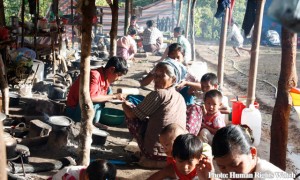4-10 February: Humanitarian Aid Denied
February 11, 2013 This week’s ceasefire talks between the Kachin Independence Army (KIA) and the Burma Government are a positive step in what has been a devastating conflict rife with human rights abuses, displacement and death. While these talks have been praised by both international governments and the United Nations, there remain many obstacles to a sustainable political settlement and lasting peace.
This week’s ceasefire talks between the Kachin Independence Army (KIA) and the Burma Government are a positive step in what has been a devastating conflict rife with human rights abuses, displacement and death. While these talks have been praised by both international governments and the United Nations, there remain many obstacles to a sustainable political settlement and lasting peace.
Hostilities are still occurring and combatants continue to resupply, increasing tensions in an already frail situation. One positive step that has been taken is the allowance of aid to those in KIA-held areas affected by the conflict. Though it should be stated that the size and scope of this aid needs to conform to the needs identified on the ground and if all of those affected will receive adequate help is yet to be determined. It is estimated that over 160,000 people have been displaced over the course of fighting. These people are living in makeshift camps and without emergency aid are at great risk of humanitarian tragedy.
Sadly the same concern for the wellbeing of men, women and children is not present in other areas affected by conflict in Arakan State. Doctors Without Borders has warned that without effective and immediate access to aid, displaced people in Arakan State face a “humanitarian emergency.” In a statement they highlight the “tens of thousands of people” who still lack access to “urgently needed medical care.” People are cut off from medical care, lack clean water and basic provisions, seen in the increase in child malnourishment.
In the face of these glaring basic human needs there has been difficulty in getting help to those affected. The issue is not formal access by those trying to deliver aid and medical attention but more informal resistance. Doctors Without Borders General Director Arjan Hehenkamp states that, “Ongoing insecurity and repeated threats and intimidation by a small but vocal group within the Rakhine community have severely impacted on our ability to deliver lifesaving medical care.” For example, clean water is available but displaced people are not able to access it fearful of violence if they do.
These conditions drive some displaced people to attempt to flee to Thailand by boat. It is estimated that over 6,000 people have entered Thailand by boat since the violence started in June of last year. The Thai government has recently implemented a policy where boats with “Rohingya boat people” will not be allowed to land and will be sent back to sea. At the same time, there have been accusations and an investigation into high-ranking Thai army officers engaging in human trafficking of Rohingya who have already landed in Thailand.
We urge that all necessary humanitarian aid be given to those in need and current obstacles be removed. Absent medical aid, access to clean water and malnutrition are just as effective in killing a human being as a bullet or a landmine. A difference being that one disproportionally affects the most venerable parts of a population and is easily preventable.
News Highlights
Inside Burma
According to the government, 17,000 civil servants have been punished following a “good governance and clean government” campaign and eight officials from the Ministry of Communications and Information Technology are under investigation for corruption
The National Human Rights Commission says it will translate UN human rights conventions into Burmese
After talks in Ruili, the Kachin Independence Organization (KIO) and the government agree to reduce armed tensions, but no ceasefire agreement is reached and the Chairman of the KIO calls for a federal union
Thousands of Rohingyas are still not registered as internally displaced persons by the government and Doctors Without Borders warns of a “humanitarian emergency” in Arakan State
Deputy communications minister says the Electronic Transactions Law, used to imprison dissidents, will be redrafted but journalists emails are hit by state-sponsored hacking
Regional
International
New US Secretary of State, John Kerry, to continue Clinton’s US policy on Burma
World Bank delegation visits Burma and agrees to target energy development and
the International Monetary Fund steps up its policy assistance
Opinion
Political Prisoner Committee Gives Reason for Hope and Caution
By Mark Farmaner
Mizzima
What Now for Myanmar’s Ministry of Truth?
By Francis Wade
Al Jazeera
Myanmar’s Debt Millstone
By Martin Hutchinson
Asia Times
Latest from the Blog
Commemoration Calls Attention to Political Prisoners’ Struggle
By Burma Partnership
Actions
Statements and Press Releases
Burma’s Prisoner Review Must Include All Those Unfairly Detained
By Amnesty International UK
UK Military Ties With Libya, Somalia and Burma Must Have Human Rights Safeguards
By Amnesty International UK
Burma Political Prisoner Committee Welcome, But Serious Questions Remain
By Burma Campaign UK
British MPs Support Rohingya Motion In Parliament
By Burma Campaign UK
Kachin Farmer Arrested and Tortured in Burma – Free Mading Zau Bawk!
By Burma Campaign UK
Joint Statement
By Kachin Independence Organization and the Myanmar Peace Team
Statement of Karen Women Organization’s 6th Congress
By Karen Women Organization
Human Rights Situation Deteriorated as Fighting Intensified in Kachin State
By Network for Human Rights Documentation – Burma
UN Special Rapporteur Visit to Assess Human Rights Situation
By the Office of the High Commissioner for Human Rights
This post is in: Weekly Highlights









 All posts
All posts